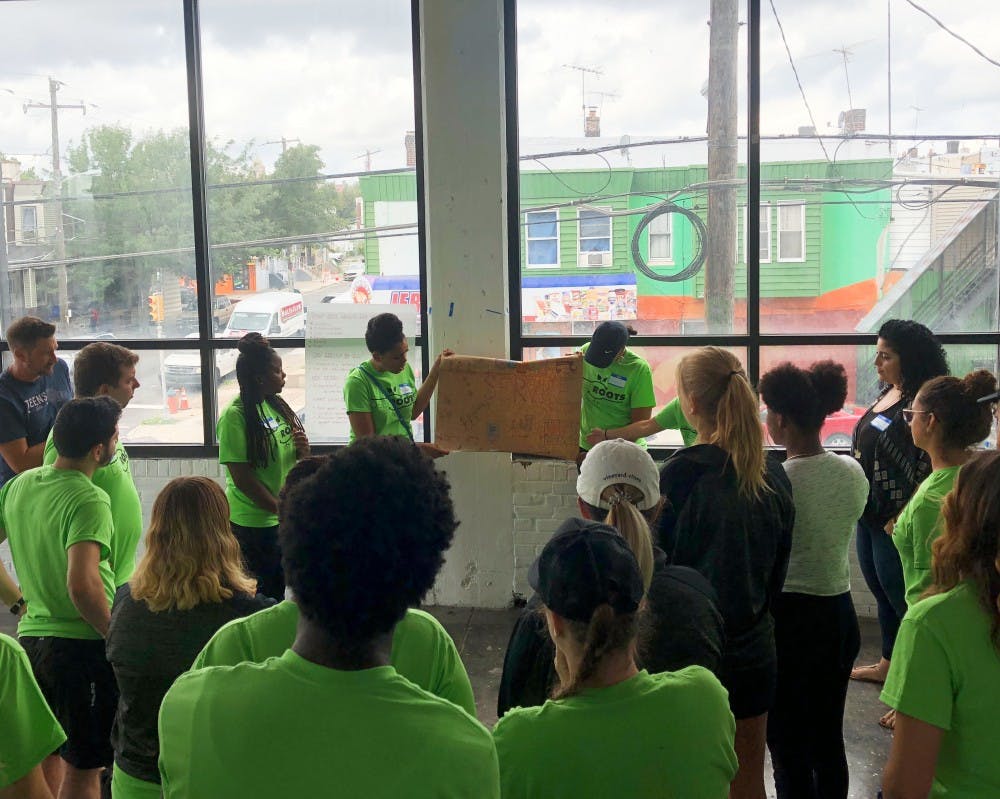
For the first time in nearly 10 years, a new charter school operator has opened a school in Philadelphia.
But with its unorthodox curricula and teaching methods, the Deep Roots Charter School has already been received with mixed reviews. At the heart of the growing controversy is Deep Roots' founder and 2014 Penn GSE graduate George Logan Blyler.
Deep Roots Charter began its inaugural school year with the rest of the Philadelphia school district in the last week of August. It is located on Frankford Avenue in northeast Philadelphia and currently enrolls 360 students from kindergarten through fourth grade.
Charter schools, which are funded by the school district but operated by independent groups that are financed by the school district, have been criticized by various advocacy groups for being divisive and perpetuating segregation in the community. As Vox.com explained, opponents of charter schools believe that "they don't all provide a high-quality education … that accountability standards aren't rigorous enough, and that charter schools exclude too many students who are difficult to educate."
In 2016, amid a national debate around charter schools, Graduate School of Education professor Sigal Ben-Porath also pointed out that charter schools tend to be more racially segregated than traditional public schools. "If one is to start a charter school by improving achievement but also limiting the breadth of education, then why would you do that in a school that targets minority populations?" Ben-Porath asked at the time.
Blyler's newest school, with teaching models that strayed from conventions, was initially rejected by the now-disbanded Philadelphia School Reform Commission.
At Deep Roots, teachers undergo training sessions led by hired coaches and administrative leaders before and after school starts. At these sessions, Blyler and other coaches have teachers review the instructional methods and educational content that teachers will later use in the classroom.
Deep Roots also implements a co-teacher system: Every teacher in the school is accompanied by a coach who occasionally intercedes in the lesson. In-class coaches give non-verbal signals, whisper, and even briefly assume the role of the primary instructor to reinforce good teaching habits.
“One of the things I say every day is that it’s a great day for us to improve and it’s an opportunity for us to get better for our kids,” Blyler said. “So everyday we want our teachers to be better than they were the day before.”
Another unique aspect of Blyler’s Deep Roots model is its service-based curriculum. Each grade at Deep Roots is given an assignment to help different welfare groups in the Philadelphia community.
Deep Roots also enforces a discipline policy based largely on “restorative-conversation," Blyler said. Students are never suspended or expelled per the discipline policy, except when required by law.
Some school district officials have been skeptical of the methods employed at Blyler’s new school. When Deep Roots applied for its charter license in February 2017, it was rejected by Philadelphia’s School Reform Commission.
Several months later, when Deep Roots reapplied and was subsequently approved, former SRC commissioner and current School Board member Christopher McGinley, who was the sole dissenting vote, criticized the school for placing far too great a burden on its teachers, the Philadelphia Tribune reported.
“Frankly, I don’t know how the finest and even the most experienced teachers could effectively manage the many programs that are in this proposal,” McGinley said at the time. “I don’t see this plan as realistic or sustainable.”
In an email to The Daily Pennsylvanian, McGinley deferred to his prior statements, writing that, although he wishes the school success, he still holds the same reservations.
1990 College graduate and 1996 Law School graduate Farah Jimenez was also a commissioner alongside McGinley when the SRC reviewed Deep Roots’ applications. Jimenez said she understands McGinley’s concerns about whether the school can sustain its many teacher and student centered-programs, adding that charter schools can also put a financial strain on the district budget.
Nonetheless, Jimenez, who voted to approve Deep Roots’ second application, said she recognized the utility of the school’s innovations, especially its emphasis on developing teachers.
“One of the challenges of being an educator is that you're often in the classroom by itself,” Jimenez said. “And to be able to have a coach that's on the side helping provide some real time support and experience is so helpful.”
Penn GSE Professor Rand Quinn made similar remarks, describing the school’s emphasis on teacher growth and its service-based curriculum “admirable.” But he cautioned that any expectations for Deep Roots should be tempered with general difficulties that come with opening a new school.
“This is their first year and there will probably be what is a very steep learning curve,” Quinn said. “So I think it's still too early to say it's innovative without seeing it in practice.”
The Daily Pennsylvanian is an independent, student-run newspaper. Please consider making a donation to support the coverage that shapes the University. Your generosity ensures a future of strong journalism at Penn.
Donate



